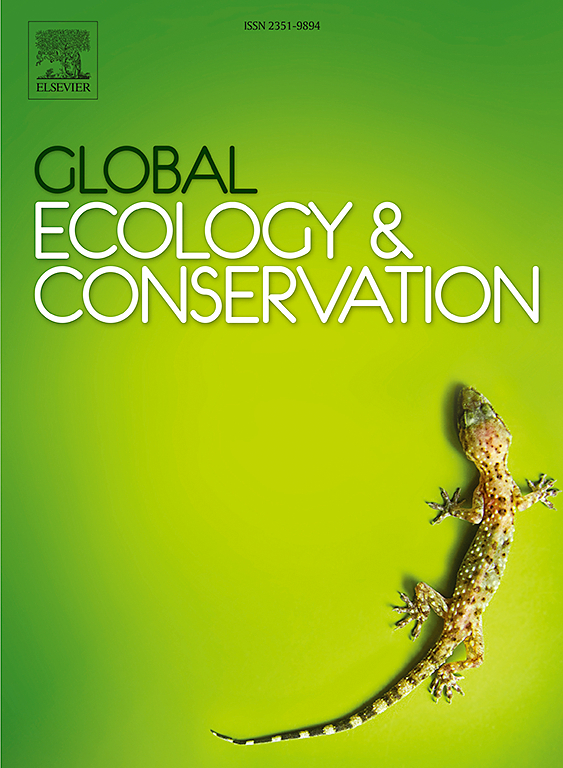Assessing the reliability of species distribution models under changing environments: A case study on cetaceans in the North-East Atlantic
IF 3.5
2区 环境科学与生态学
Q1 BIODIVERSITY CONSERVATION
引用次数: 0
Abstract
- 1.Species Distribution Models (SDMs) assume stable relationships between species and their environment from which predictions are made. These relationships are likely to vary with changing environments, and predictions might depend more on modelling choices than on empirical data. Reliability assessments of predictions are necessary to support policy-making.
- 2.We identified environmental extrapolations among potential predictions of cetaceans’ distribution from 2005 to 2020 in the North-East Atlantic and calculated the percentages of calibration data with similar environments (nearby data), supporting these predictions. Thus, the assessment of reliability is generic, as evaluated before model fitting.
- 3.Predictions on continental shelves were extensively supported by the calibration data and were more reliable throughout the year than predictions on continental slopes and abyssal plains, which were more supported in summer. Predictions off Portugal were particularly uncertain due to the lack of surveys in this region of deep, warmer waters with seamounts.
- 4.The high effort between May and July led to a southern winter shift of nearby data, following the decrease in temperatures. A large part of the predictions between December and April was extrapolated due to the low coverage of the winter primary productivity drops, spring peaks and cold waters. They were based on data collected during other seasons and regions, and given the large spatial extent of the area, and the seasonality and regionality of the cetacean distributions, reliable winter predictions might be restricted to geographic areas where winter surveys took place. These predictions are more uncertain and warrant caution.
- 5.Synthesis and applications: extrapolations and nearby data highlighted environmental gaps to predict cetacean distributions in the North-East Atlantic, which could be covered by future surveys. This informs model users of regions and periods when predictions reliability becomes uncertain. SDMs are invaluable tools for supporting conservation applications and, despite the warnings that have been issued, the degree of information available for predicting distribution is still rarely reported. We recommend adding this assessment as routine information on the reliability of predictions.
评估变化环境下物种分布模型的可靠性:东北大西洋鲸目动物案例研究
1.物种分布模型(SDM)假定物种与其环境之间存在稳定的关系,并据此进行预测。这些关系可能会随着环境的变化而变化,预测结果可能更多地取决于建模选择而非经验数据。2. 我们确定了 2005 年至 2020 年东北大西洋鲸目动物分布潜在预测的环境推断,并计算了支持这些预测的类似环境(附近数据)校准数据的百分比。因此,对可靠性的评估是通用的,在模型拟合之前进行评估。3.大陆架上的预测得到了校准数据的广泛支持,全年都比大陆坡和深海平原上的预测更可靠,后者在夏季得到更多支持。4. 5 月至 7 月期间的大量工作导致附近数据随气温下降而南移。由于对冬季初级生产力下降、春季高峰和寒冷水域的覆盖率较低,12 月至 4 月间的大部分预测都是推断出来的。这些预测是基于其他季节和地区收集的数据,考虑到该区域的空间范围较大,鲸目动物分布的季节性和区域性,可靠的冬季预测可能仅限于进行冬季调查的地理区域。5.综合与应用:推断和附近数据突出了预测东北大西洋鲸目动物分布的环境差距,未来的调查可以覆盖这些差距。这为模型用户提供了预测可靠性变得不确定的区域和时期的信息。SDM 是支持保护应用的宝贵工具,尽管已经发出了警告,但预测分布的可用信息程度仍然很少被报告。我们建议增加这一评估,作为预测可靠性的常规信息。
本文章由计算机程序翻译,如有差异,请以英文原文为准。
求助全文
约1分钟内获得全文
求助全文
来源期刊

Global Ecology and Conservation
Agricultural and Biological Sciences-Ecology, Evolution, Behavior and Systematics
CiteScore
8.10
自引率
5.00%
发文量
346
审稿时长
83 days
期刊介绍:
Global Ecology and Conservation is a peer-reviewed, open-access journal covering all sub-disciplines of ecological and conservation science: from theory to practice, from molecules to ecosystems, from regional to global. The fields covered include: organismal, population, community, and ecosystem ecology; physiological, evolutionary, and behavioral ecology; and conservation science.
 求助内容:
求助内容: 应助结果提醒方式:
应助结果提醒方式:


